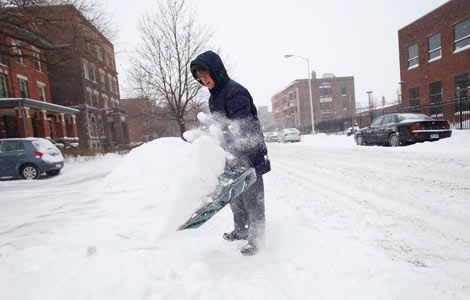Holiday blues brewing for students overseas
Updated: 2014-01-03 08:32
By Peng Yining (China Daily)
|
||||||||
Zhao Sisi went to the United Kingdom to study accountancy and finance in 2010 when she was age 19. However, when she decided to return to China during her first winter break, a heavy snowfall left her stranded at an airport in London for three days. Because all the direct flights to the Chinese capital were canceled, she eventually flew to Moscow before transferring to a Beijing-bound flight.
"It took five days to get home, but the holiday was only 10 days," she said. "Knowing how difficult it was to travel, my mum urged me not to bother. I burst into tears when she said that. I had to go home."
For the past three years she has lived alone in Devon, southwest England, and has moved home every year. An app on her smartphone counts down her remaining days in the UK.
|
|
Every time she says goodbye to her parents at the airport in Beijing, Zhao turns on her heel and practically runs through the customs area. "I never turn back to look at them. I just want to disappear as quickly as possible," she said. "My parents asked why, and I said I would cry if I turned back and might even be unable to bring myself to leave."
Missing home
Statistics from the Ministry of Education show that in 2013, 450,000 Chinese students were studying overseas, a rise from 400,000 in 2012. Meanwhile, an increasing number of young people have expressed an interest in studying abroad, according to a report published by the Center for China & Globalization. It showed a 31 percent rise in the number of Chinese who traveled to the US to study as undergraduates last year. The authors noted that the three main challenges they face are the cultural gap, study pressures and loneliness.
"In the beginning, my English wasn't good enough to understand what the teachers said in class, so I had to record it and listen to the audio later," said Zhao.
On average she needed at least four hours to understand a one-hour class, but more time was required if the lesson featured a test or presentation.
"It was really difficult, and the more difficult my life became the more I missed home," she said.
At age 16, Duan Xiaotong began studying at a high school in Finland. After that, she moved to the US to study chemistry. Life overseas has made the Chinese festivals more important and meaningful to her.
"I didn't really care about Spring Festival before. I was always bored by watching the New Year gala on TV, but since I left home it's become the most important event of my year."
Now, Duan always watches the gala with fellow Chinese students while eating traditional snacks brought from home, including dried bean curd and hawthorn fruit with caramel.
"The holiday season is fun in the US, but a family reunion is more important, so I go home during the winter break every year," she said. "Many Chinese teenagers living overseas want to go home. The decision to study in a foreign country was made by their parents not by them."

 The Lego version of Downton Abbey
The Lego version of Downton Abbey
 Police probe fire attack on Chinese consulate
Police probe fire attack on Chinese consulate
 Powerful storm brings Arctic cold, snow to US
Powerful storm brings Arctic cold, snow to US
 Beijing sees little improvement in air quality
Beijing sees little improvement in air quality
 125th Rose Parade celebrated in US
125th Rose Parade celebrated in US
 Cold doesn't dissuade 'Polar Bear Swimmers'
Cold doesn't dissuade 'Polar Bear Swimmers'
 First photos of Liaoning battle group made public
First photos of Liaoning battle group made public
 US First Family out for shave ice in Hawaii
US First Family out for shave ice in Hawaii
Most Viewed
Editor's Picks

|

|

|

|

|

|
Today's Top News
As Obamacare begins, critics launch new assault
FBI: Consulate fire not terrorist act
Smog may affect mental health
New joint command system 'on way'
Chinese helicopter saves 52
US citizens express little hope in govt
China protests US' prisoner transfer
Snowstorm pushes into US Northeast
US Weekly

|

|







